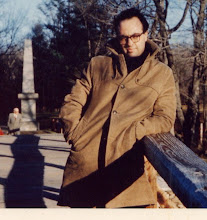The first word was as black as black wool.
BEGINNING
1938 had been a rough year for Jeniya and Aaron Kohan of Hope, Massachusetts. They sat in their Bryant Street tenement apartment by their radio as Hitler marched into Austria, seized a chunk of Czechoslovakia, destroyed almost every synagogue in Germany, sent tens of thousands of Jews to concentration camps, as the British, French, and American governments turned away, bent over, and showed the world their big fat democratic arses. In October, Orson Welles's radio broadcast convinced the Kohans that they were under Martian attack. "Good heavens, something's wriggling out of the shadow like a snake," the reporter's voice came over the radio. “That face. I can hardly force myself to look at it. The eyes, black. They gleam like a serpent's. The mouth V-shaped. Saliva dripping from rimless lips that quiver and pulsate. It's raising up. Opening it's mouth. The sound. I can't bear it. Help!" This finally did it. Jeniya Yudeos Kohan felt cramps marching into her guts, seizing her body, destroying her peace of mind. An hour later, she delivered her first child, Daniel, a month early. "No wonder he always wants to climb back into me." She told people this to explain why she pushed her child away so much.
"My Uncle Max Yudeos is the king of Jewtown." That's what six-year-old Danny Kohan scrawled into his notebook before he knew that Jewtown was an insult. He sat on the peeling painted front stairs of his four-family tenement a few buildings up from a clangorous red-brick factory that stamped blue-steel plates into truck-bodies in this industrial suburb of Boston. A city Rand-McNally called Hope. A city the residents called Hopeless.
Of all members of the extended immigrant family, Danny most resembled his mother’s only brother, Max (legal name Moyshe), with his sensitive black eyes, swarthy skin, dark curly hair, gapped front teeth, and body big as a horse and a half. Like his uncle Max (then serving in the Marines in the European Theater in part because he spoke German), Danny wanted out of town. He lined up stolen pennies on the railroad tracks at the foot of Bryant Street for the spouting steam engines to flatten into new shapes. Jealous of the redwinged blackbirds that nested alongside the tracks in a ditch where puppies with bloated tummies often drifted by, Danny imagined himself soaring into the sweet air, beating his wings emblazoned by those red chevrons that look like raw wounds, his song a rusty gate. Opening. Leaving all his cares and woe behind him. Bye-bye, Hopeless.
Danny's family lived at the outer reaches of Hope's informal Jewish ghetto. In a block of tenements housing mostly Irish and Italians, leavened with a few working-class Jewish families. His family had to stay within walking distance of the old orthodox synagogue, Beth Shalom, with its 500-family congregation. And his mother needed to stay within walking distance of her mother, the family matriarch Sarah Yudeos, who never did more than sit in her padded wooden chair, her arms rigidly crossed over her chest like a hex sign to keep out the evils of the world. It didn't work. Only her lively blue eyes and occasional Yiddish mumble convinced Danny she wasn't a Hebrew mummy. Running from Hitler, in 1933 she arrived from Poland miraculously on America’s blessed shores with nothing besides her Jewishness, her five children, and a susceptibility for polio. Three daughters obeyed the Yudeos family prescription for survival--follow Jewish custom and ritual and marry in the synagogue. But then. The fourth daughter--diminutive, dark-eyed, and buxom Jeniya--eloped with Aaron Kohan--a handsome, talented and hard-working photographer from Minnesota, no more than 5-foot 5-inches tall. And Max married Sally O'Flaherty--they both drank a lot. Jeniya and Max broke their Orthodox Jewish mother's heart and aggravated her polio. She never forgave them. They never forgave themselves.
With Jeniya, Danny was always, to use her phrase (which she uttered with a Yiddish accent and an equally wide, embarrassed smile), up shit's creek without a paddle. By eight years' old, given his mother's emotional distancing, Danny (a singer with no mean voice), glommed onto Bunny Berrigan, who played his trumpet as though his mouthpiece was set against his heart. His line--"I'm broken-hearted, 'cause I can't get started with you"--Danny would sing repeatedly until a Jeniya slap upside his head snapped him out of it.
Tuesday, March 11, 2008
Subscribe to:
Post Comments (Atom)

No comments:
Post a Comment